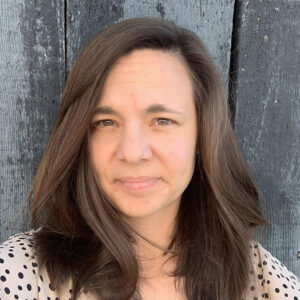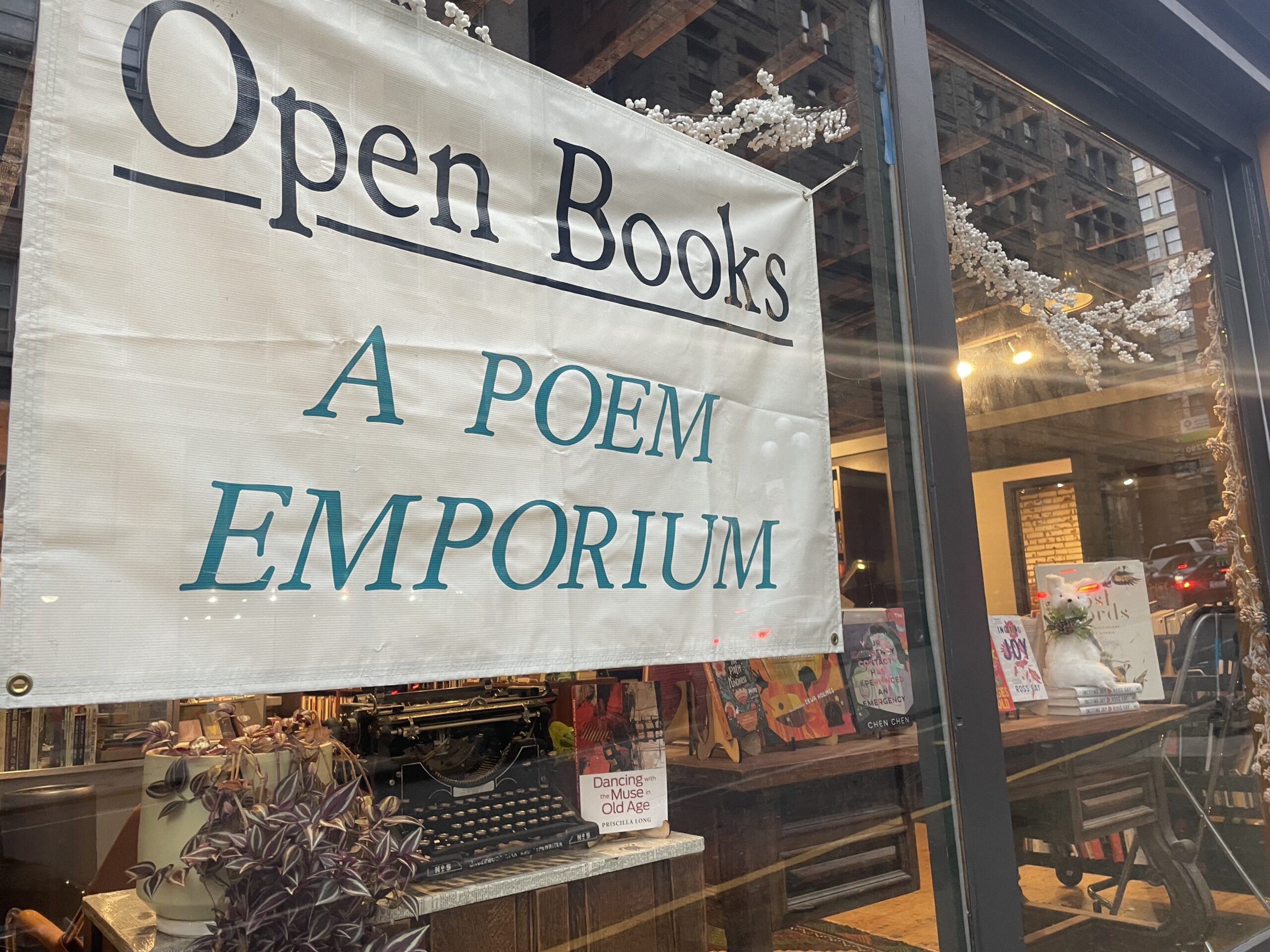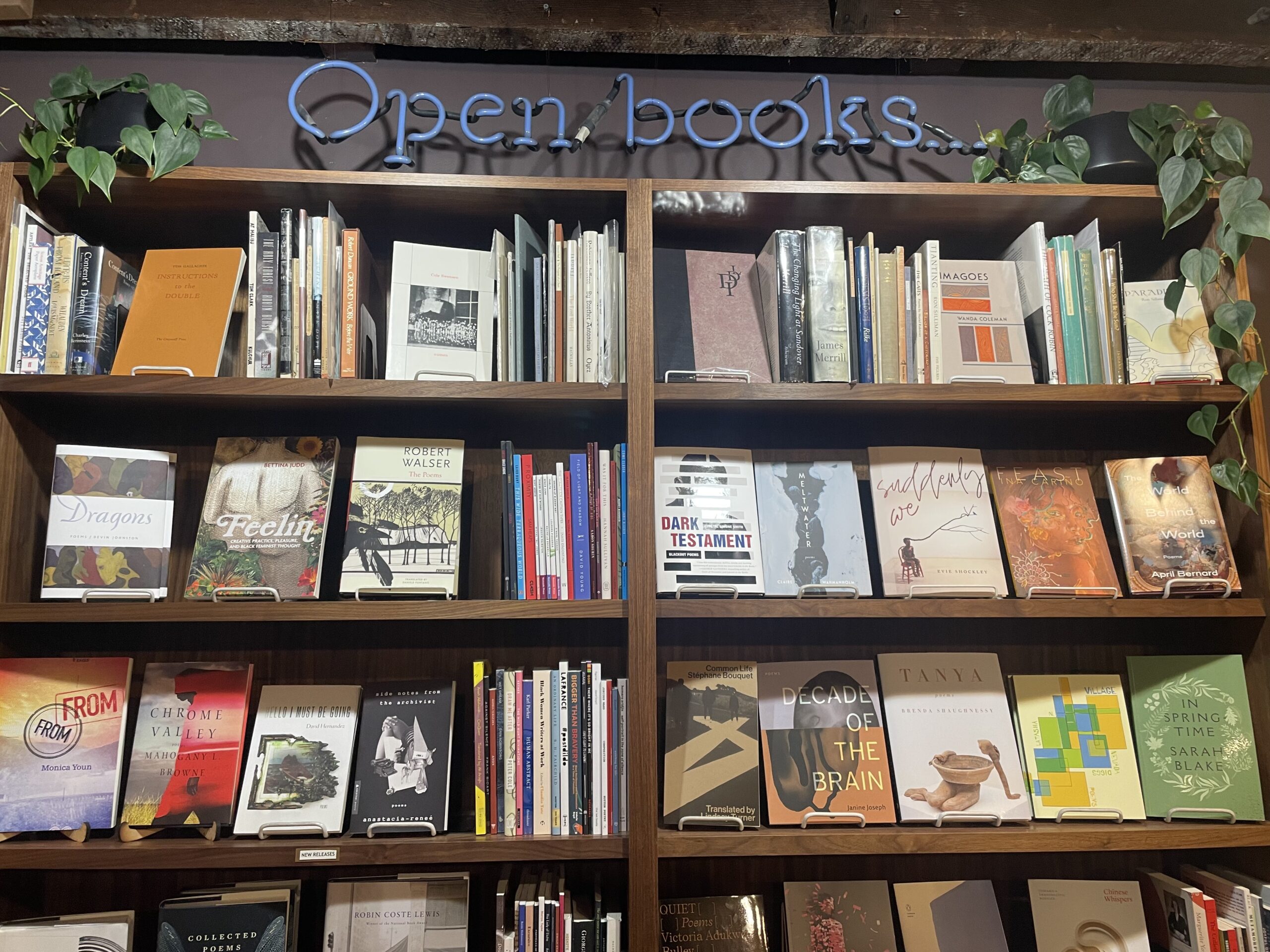Spring 2023
3
Holding Space:
A Conversation with Billie Swift
Hannah D. Markley, Contributing Writer (Class of 2023)
Holding Space:
A Conversation with Billie Swift

Hannah D. Markley
Contributing Writer
Class of 2023
For the last several years, Open Books: A Poem Emporium has supplied the RWW summer residency with faculty and guest books. Billie Swift (2016) owns Open Books, and in spring 2022, she moved the bookstore from its longtime location in Seattle’s Wallingford neighborhood to Pioneer Square. Billie’s chapbook Everything Here was published by Sibling Rivalry Press in 2019. Billie and I spoke over the phone the day after the bookstore hosted an event with poet and essayist Ross Gay at Town Hall with Seattle Arts and Lectures. This interview has been edited and condensed for clarity.
***
Billie Swift: I’m coming off the heels of probably the biggest event since I’ve been at the bookstore. We were selling books at the Ross Gay reading at Town Hall.
Hannah D. Markley: How did that go?
BS: It went well. I mean, he’s such a phenomenal reader. He’s such a phenomenal thinker and exister in the world.
HDM: I’ve never had a chance to hear him read, but I imagine it would be wonderful. I’m not a poet, but I admire that the bookstore is a poetry-only space. I know you inherited that [from the previous owners].
BS: Well, we’ll say we’re dedicated to poetry, but I also love essays and fiction. So, we have an [essays and fiction] section in the store that will probably only continue getting bigger. For my thesis project [at RWW] I ended up reckoning with the questions that arise when reading something in translation, so I also have this slowly growing section that I just call “On Translation.” So that’s to say we exist beyond poetry, with poetry as the beating pulse.
HDM: Thank you for correcting me. Were the essays and fiction something that you wanted to bring in when you started your time at the bookstore?

BS: Those books were in the store before, but it’s a section that I have been happily willing to expand.
HDM: Tell me about the first poetry book you remember reading.
BS: The first book of poetry I can remember was probably back when I was a kid reading Shel Silverstein, if we're talking literally the first thing I can remember.
HDM: Do you remember what book made you want to write poetry, or what book you first responded to in poetry, even if it wasn’t a poetry book?
BS: One of the first books I read was Mark Doty’s Atlantis. That book meant a lot to me. I remember reading a Wordsworth poem in high school and sort of acknowledging that I was really interested in that. But I was late opening myself up to poetry. For some reason I decided that I didn’t understand it. I was a literature major in college but felt like I didn’t get poetry, except, every time we would read a poem in class, I’d be talking the whole time and loving it. But then afterwards I’d be like, “No, no, I don’t understand poetry.” So, I did this weird thing with poetry.
I remember reading Emily Dickinson in college out loud, but it wasn’t until after college that I got these recordings of poets reading their work [that] something just opened. Then, listening to T.S. Eliot read “Prufrock” was another big moment [for me]. The part of my brain that thought experiencing a poem and understanding a poem had to be one and the same was finally able to quiet down and leave room for all of the various experiences that go along with encountering poetry. Once I was able to do that, I just never turned back.
HDM: Thanks so much for sharing that. What’s your relationship to writing currently now that you own a bookstore?
BS: I haven’t written in the last few years. I was very fortunate to have the opportunity to publish a chapbook with a press I deeply love. (Everything Here was published by Sibling Rivalry Press in 2019.) The chapbook is comprised largely of poems written during my MFA experience.
“I remember reading Emily Dickinson in college out loud, but it wasn’t until after college that I got these recordings of poets reading their work [that] something just opened.”
HDM: What led you to the RWW MFA program?
BS: I lived in New York. I became pregnant as we were getting ready to move from New York to Seattle. When we got here, I was focused on that. When we were in New York, I had somehow come upon this group of people who randomly got together to talk about poetry. I think it even came out of a Craigslist ad. It’s all so bizarre to me how [the group] came into being that sometimes I wonder if it even happened. But I’m pretty sure [it did], and it was wonderful. We would meet every month. We didn’t know each other, and we would just talk about poets.
When I was in Seattle, after my second kid was born, I realized that I missed that but had to figure out how to do both. The low-residency MFA model really was helpful in that regard because it allowed me to continue being present with my kids while at the same time being completely not present at all because I just fell headfirst back into [talking about poetry]. Everyone that I talked to about [RWW] mentioned how much the students wanted an opportunity to think and write and read with other people. That was my interest as well. Then I looked up the faculty and really enjoyed their work, and that’s how that happened.
HDM: It seems like there’s a thread of talking with people about literature that kind of carries through the bookstore and with your own writing practice. I know one of the things you were excited about with moving to Pioneer Square was being able to have space for people to gather. How has the new location impacted your ability to offer space and gatherings? And what are some of the hopes you have for [the space] in the next year?

BS: I honestly think that all is still finding its way in the midst of the pandemic. Gathering is still such a complicated endeavor for so many reasons for people right now. Both the literal physical limitations of getting together as well as all the ways that people are sort of processing their gaze, their experiences, and the particular turbulences of the time.
When we got the space, it was before Omicron. There was this hope, [that is would be] something that was going to come and go. It isn’t, and it hasn’t.
I think the degree to which everyone’s processing and acknowledging and accepting that is different, but it’s a fact that remains. That’s affected what it looks like to call people in and make a space for people.
What I’ve sort of transitioned to thinking about is holding those spaces and figuring out how to create the spaces to be flexible enough to meet people where they are in terms of their needs—whether they need to be in spaces where they can be alone or spaces where they need to be around other people [and] have something to look forward to. Planning is such a fraught endeavor these days, you know?
There’s so many elements to how we are experiencing our relationship to the outside world right now. The store’s placement in that has been a challenge.
HDM: Yes, I don’t envy your position at all in making those decisions! I saw that you’re offering your space to people who are coming in for AWP as well. Have you had people respond to that?
BS: AWP is marvelous is some ways and incredibly overwhelming in others. The hope is that [The Parlor] room is an opportunity for people to walk that line that we were talking about before in terms of constantly changing needs that we’re all experiencing and how we’re moving around in relation to other people and ourselves when we’re existing in outside spaces.
HDM: How can the RWW community support you and your work this year?
BS: Buy books from us. Encourage friends to buy books. Everything on our site is manual, and we are trying desperately to keep up with as much as we can, but we are a staff of few―not a lot of hands trying to make it all go. If people have a book coming out, they can reach out to us. We’ll make a page, and they can share it with all their friends.
HDM: Thanks for taking the time to talk to me after a busy night. I hope you can rest today.
BS: Yes, I think I will. My plan for today is laundry and reading, and I’m excited for both.
